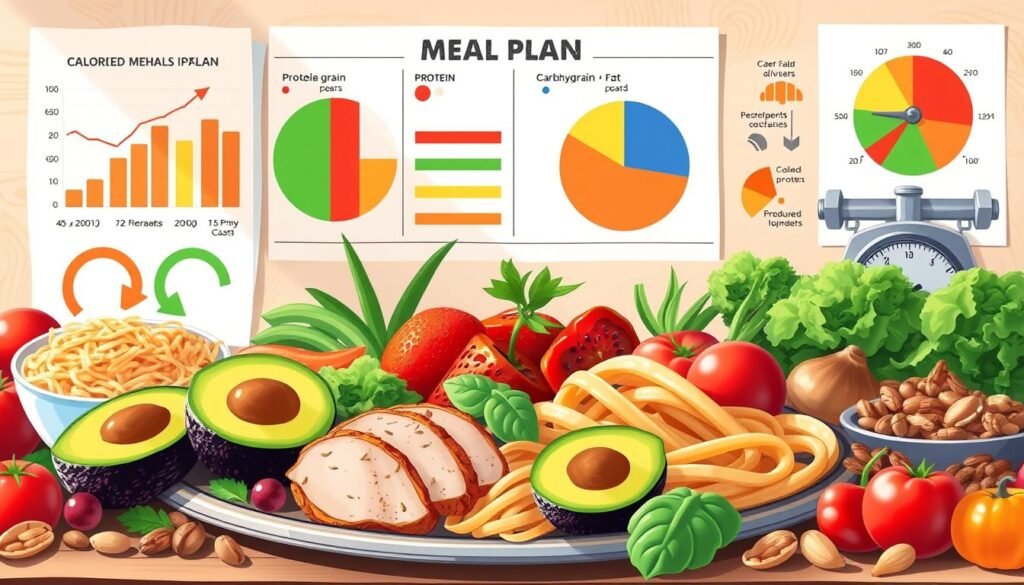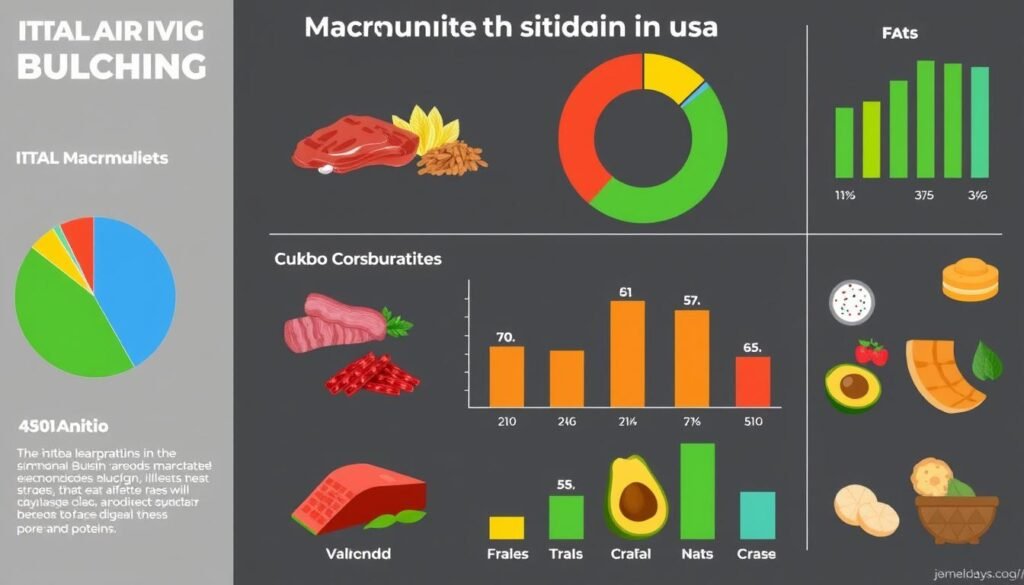Did you know macronutrients make up about 40% of our total calories? These nutrients are vital for those striving to bulk up. Getting the right balance of proteins, carbs, and fats is key to muscle growth, energy, and health during a bulking diet.
This guide will take you through the roles of each macronutrient. You’ll learn how to figure out your caloric needs. Plus, find out the best macronutrient ratios for making gains. With a focus on eating more calories for muscle gain, this guide is your roadmap to nutritional success in fitness.
Key Takeaways
- Macronutrients include proteins, carbohydrates, and fats essential for muscle growth and recovery.
- Understanding caloric needs is crucial; aim for a calorie surplus of 250-500 calories daily.
- Adequate protein intake of 1-1.5 grams per pound of body weight is recommended for bulking success.
- Carbohydrates are the primary fuel source, important for energy production in workouts.
- Healthy fats aid in nutrient absorption and overall hormone regulation.
- Meal planning is vital to ensure balanced nutrient intake throughout the bulking phase.
- Supplements can support dietary efforts but should be used effectively alongside a solid meal plan.
Understanding Macronutrients
Macronutrients are key to our diet because they give us essential substances our bodies need. We mainly have carbohydrates, proteins, and fats. Each one has special roles that help keep us healthy and active.
Carbs are super important as they give us energy, especially when we move a lot. They should be the biggest part of what we eat every day. We need about 3 to 5 grams of carbs for every kilogram we weigh. This is to make sure we have enough energy for exercise and to recover afterward.
Proteins are crucial for building and repairing our muscles. If you’re trying to get bigger muscles, you should eat about 1 to 1.5 grams of protein for every pound you weigh. This equals about 1.4 to 2.0 grams per kilogram. Eating this much protein helps our muscles grow.
Fats are also important, and they give us a lot of energy—more than carbs or proteins. But we should choose healthy fats, like unsaturated fats, over bad ones, like trans or saturated fats. Fats should be about 20% to 30% of what we eat in a day. They help us take in vitamins and grow cells.
It’s important to balance these macronutrients to eat well. A good mix for muscle building might be about 24% of your daily calories from protein, 48% from carbs, and 28% from fats. Knowing how each macronutrient works helps us make better eating choices and improve our fitness.
Why Macronutrients Matter for Bulking Success
When aiming for bulking success, it’s crucial to understand the role of macronutrients. They are key to muscle growth and overall fitness. Carbohydrates fuel intense workouts. Proteins help repair and build muscle tissue. And fats are vital for hormone production and other functions.
To bulk up, you typically need to eat more calories than usual. The normal surplus is between 500 to 1500 calories over your daily needs. For a leaner bulking approach, only add 200-300 extra calories. This helps build muscle without adding too much fat.
Your macronutrient mix should match your personal goals and needs.
- Protein 30%, Fat 30%, Carbohydrates 40%
- Carbohydrates 50%, Protein 30%, Fat 20%
- Carbohydrates 40%, Protein 25%, Fat 35%
During bulking, aim for 2 to 2.5 grams of protein per kilogram of your weight. Carbohydrates should be 4 to 7 grams per kilogram. Fats should be between 0.5 to 2 grams per kilogram. After 4 to 6 weeks, assess your progress. Adjust your diet as needed to ensure the best muscle gains.
Knowing about macronutrients can help prevent unwanted fat gain. It can also lead to significant muscle growth. Choosing the right diet makes your bulking phase more successful.

Calculating Your Caloric Needs for Bulking
To effectively bulk up, you need a smart plan for your calories. You have to eat more calories than you burn. This creates a calorie surplus, leading to muscle growth. Calculating your caloric needs takes into account your age, sex, weight, how active you are, and your genes. This helps create a plan that works best for you and your body.
The Mifflin St. Jeor equation is a good way to figure out how many calories you need at the start. By understanding your total daily energy use, you can see how many more calories you need to bulk effectively. For instance, gaining a pound of muscle means eating an extra 2,000 to 2,500 calories on top of what you normally burn.
When bulking, how you divide up your macros matters a lot. For a guy who weighs 180 pounds, his protein should be between 237 and 855 calories every day. This is about 59 to 214 grams. A woman weighing 145 pounds needs to get 166 to 607 calories from protein each day. That’s 42 to 152 grams. Carbs should make up half of your daily calories. You should eat 3 to 5 grams of carbs for each kilogram you weigh. Healthy fats from things like olive oil and avocados should be 20 to 35% of your daily calories.
Different calorie plans like Standard, Leangains, and Keto can make your bulking plan even better. Each one uses different goals and activity levels. Getting your calories right helps you build muscle without gaining too much fat.

Macronutrients for Bulking: The Ideal Ratios
Getting the right mix of macronutrients is key for bulking. Proteins, carbohydrates, and fats should be well-balanced. This helps muscle growth and controls calorie intake.
Recommended Macronutrient Ratios
People have different needs based on their goals and body types. Yet, a good macronutrient ratio for bulking is:
| Macronutrient | Percentage of Daily Calories |
|---|---|
| Protein | 25-30% |
| Carbohydrates | 40-50% |
| Fats | 20-25% |
This setup offers enough protein for muscle repair and growth. It gives enough carbohydrates for energy during exercise. Healthy fats are also crucial for well-being and hormone health.
Understanding Calorie Surplus
For bulking, you need to eat more calories than you burn. Usually, you should eat 5% to 15% more calories. This approach can lead to gaining about 0.5% to 1% of your body weight each week.
Remember, getting your calories right matters most for weight gain. Choosing quality foods that match these macronutrient ratios helps. It makes sure the extra weight is more muscle than fat.

Protein: The Muscle-Building Macronutrient
Protein is key for muscle growth and recovery. A successful bulking phase needs enough protein to start muscle protein synthesis (MPS). It’s crucial to hit optimal MPS levels for the best muscle mass gains.
Importance of Adequate Protein Intake
Aim for 0.8 to 1 gram of protein per pound of body weight daily during bulking. This ensures enough amino acids for muscle recovery and growth. Balanced amino acid profiles in protein sources help even more. Spreading protein intake throughout the day can improve muscle-building results.
Best Protein Sources for Bulking
For the best protein sources, consider:
- Chicken breast
- Lean beef
- White fish
- Egg whites
- Greek yogurt
- Cottage cheese
- Protein powder, including whey and casein
These protein sources meet the recommended intake and offer extra nutrients. Lean beef adds essential nutrients, while Greek yogurt has probiotics. High-quality proteins are important during an intense bulking phase.
Keep a balanced diet as energy levels might change during bulking. Check out energy management strategies to handle fatigue. This helps while increasing caloric intake. Balancing macros and getting enough protein is key for building muscle.
Carbohydrates: Fuelling Your Workouts
Carbohydrates are key for workout energy, especially in endurance and strength training. They are the top energy source for the body, refilling glycogen stores that are crucial for top-notch performance. Learning to use different carbohydrate types can improve workout results and help with recovery.
Chronology of Carbohydrate Energy Use
Carbs quickly turn into glucose during exercise, which muscles use for energy. After hard workouts, eating enough carbs is needed to refill glycogen. A 2018 Nutrition Reviews study highlights the need to eat high-glycemic carbs right after working out and then every 30 minutes for four to five hours for best replenishment.
Experts say carbohydrates should be 45% to 65% of an adult’s total calories, as the 2020-2025 Dietary Guidelines for Americans advise. Athletes doing intense training might need more, about 6 to 10 grams of carbs for each kilogram of their lean body weight each day.
Top Carbohydrate Sources for Bulking
Choosing the right carbs is crucial for good performance. Here are the best picks:
- Whole grains: Foods like brown rice, quinoa, and oats have complex carbs for longer-lasting energy.
- Fruits: Bananas, berries, and apples are natural sugar and nutrient sources, helping with recovery.
- Starchy vegetables: Sweet potatoes and corn bring important nutrients and carbs for workout energy.
Adding these carb sources keeps energy up, prevents muscle loss, and aids recovery. Without enough carbs, the body may use muscle for energy. This increases muscle loss risks and slows down recovery. Athletes should work with a dietitian to adjust their carb intake as needed.
For better strength and muscle growth, aim for 8 to 10 grams of carbs per kilogram of body weight daily. Eating the right amount of carbs, especially after workouts, is key for keeping performance high and getting the most out of bulking. For deeper insights on carbs and strength training performance, check this study.
Healthy Fats: Supporting Overall Health
Adding healthy fats to your diet is key for good health and building muscles. These fats provide energy, help absorb vitamins, and produce hormones we need. Eating unsaturated fats from avocados, nuts, and olive oil is important. It makes your diet better, supporting your workout and recovery time.
The Role of Dietary Fats in Muscle Growth
Fats in your diet help muscles grow by creating a rich energy source. They have 9 calories per gram. For clean bulkers, having 20% to 30% of calories from fats is suggested. Omega-3 fats are especially good. They fight inflammation and keep your heart and brain healthy. Omega-3 rich foods, like wild Alaskan salmon, are key for muscle and health. For more on protein-rich foods for muscles, check out this resource.
Healthy Fat Sources to Consider
Adding different healthy fats to your meals improves nutrition and muscle growth. Below is a table with some top choices:
| Food Source | Type of Fat | Fat Content (g per serving) | Benefits |
|---|---|---|---|
| Avocado | Monounsaturated | 19.7 | Rich in vitamins, fiber, and protein |
| Wild Alaskan Salmon | Omega-3 | 2.2 (per 3 oz) | Supports heart health and reduces inflammation |
| Peanuts | Monounsaturated | 16.1 | High in protein and healthy fats |
| Coconut Oil | Saturated | 13.6 | Potential benefits for muscle building |
| Walnuts | Omega-3 | 18.5 | Rich in antioxidants and healthy fats |
Choosing quality healthy fats helps meet nutritional needs and muscle growth. A balanced diet helps you bulk up while avoiding too much fat storage.
Meal Planning for Effective Bulking
Meal planning is key for getting the right calories for muscle growth in the bulking phase. A planned approach ensures you get enough calories and nutrients for body changes. Eating the right balance of proteins, carbs, and fats helps build muscle and keep you healthy.
Creating Balanced Meals
Balanced meals need carbs, fats, and proteins to reach muscle-building goals. Aim for 40% proteins, 35% carbs, and 25% fats for the best results. Clean bulking focuses on healthy foods for nutrient-rich meals. Dirty bulking emphasizes quick weight gain through high-calorie foods. Both ways have their benefits, but balanced meals are better for your health in the long run.
Meal prepping makes nutrition easier to manage. It ensures you eat what supports your goals, avoiding bad choices. Using sample meal plans can make bulking simpler and more practical.
Sample Meal Plan for Bulking
| Meal | Food | Calories | Proteins | Carbs | Fats |
|---|---|---|---|---|---|
| Breakfast | Oatmeal with peanut butter and banana | 500 | 20g | 70g | 15g |
| Snack | Greek yogurt with berries | 200 | 15g | 25g | 5g |
| Lunch | Grilled chicken with brown rice and broccoli | 600 | 50g | 60g | 15g |
| Dinner | Salmon with quinoa and asparagus | 700 | 45g | 55g | 30g |
| Evening Snack | Protein shake with almond milk | 300 | 25g | 15g | 10g |
Using sample meal plans helps you get the right nutrients. This leads to a better bulking phase and a commitment to health. Check out a detailed guide on meal planning here.
Incorporating Bulking Supplements
When you’re bulking up, adding supplements can really help. They boost muscle growth and recovery. While you should mainly eat whole foods, the right supplements add extra protein. This helps your muscles grow better.
Popular Bulking Supplements Explained
There are many supplements for bulking. Each one has its own benefits. Here are some top picks:
- Whey Protein: Great for quick absorption after working out.
- Casein Protein: Slow to digest, so it’s good before going to bed.
- Creatine: It increases strength and muscle by boosting ATP production during workouts.
These supplements serve unique roles in training and recovery. They should add to your diet, not replace whole foods. They make sure you’re getting all you need.
How to Use Supplements Effectively
Using supplements the right way is key. Here’s how:
- Work out how much protein you need. Aim for about 1.6g/kg of your weight each day for muscle building.
- Add protein powders to a diet that’s 250-500 calories above your usual. This helps muscles grow but keeps fat low.
- Go for clean bulking. It means more muscle, less fat, and staying healthy.
- Mix whole foods and supplements like protein powder. It boosts calories without making you too full.
- Keep an eye on what you eat. Try for 20-25% protein and 30-35% fats for best muscle growth.
Choose supplements wisely and use them along with a good diet. This is key to bulking up successfully. Remember, the right food, training, and recovery are all important.
| Supplement | Type | Purpose | Best Time to Use |
|---|---|---|---|
| Whey Protein | Protein Powder | Post-workout recovery | Immediately after workouts |
| Casein Protein | Protein Powder | Nighttime muscle preservation | Before bedtime |
| Creatine | Performance Enhancer | Boost strength and power | Before workouts |
Conclusion
Bulking up the right way means knowing how much protein, carbs, and healthy fats you need. It’s about eating the right balance to grow muscles and stay healthy. People who eat based on macronutrients rather than just counting calories see better results. They get stronger and improve their body shape.
To bulk up well, you must figure out how many calories you need. Then, follow a plan with the right mix of proteins, carbs, and fats. You should eat about 2.3-3.1 grams of protein per kilogram of your body weight each day. It’s also key to eat good carbs and fats. Eating right after you work out is important for muscle growth and to help you do better in your next workout.
The best way to bulk up involves careful meal planning and eating whole foods. Sometimes, you might add supplements. Avoid junk food and too much sugar. This way, you’ll reach your muscle-building goals in a healthy, lasting way.